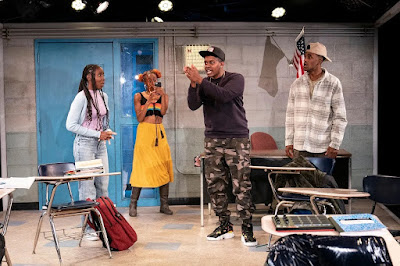The settings and the circumstances are the same in two new off-Broadway shows that portray the plight of the young Black and Brown people who are so often trapped in systems that view them—and force them to see themselves—as failures who have no real future ahead of them.
Both open in sterile classrooms that have seen better days. And each is populated by a half dozen or so teens who are paying penance for wrongdoings. Audiences are seated on either side of both playing areas, creating an intimacy that ultimately makes viewers complicit in each story’s outcome.
The students in Dave Harris’ Exception to the Rule, now playing in the Roundabout Theatre’s Black Box through June 26, have been assigned to detention on the Friday before a holiday week-end. Most of them are no strangers to this purgatory.
They’ve done penance before for talking back to teachers, violating the school’s dress code, getting into fights and otherwise failing to follow the rules. But the regulars are shocked when they’re joined by Erika, a straight-A student with a rep for doing the right things.
As they wait for the detention-room teacher to show up and sign the pass slips that will allow them to leave, the others flirt and bicker with one another and try to guess why Erica is among them. Director Miranda Haymon has her game young cast playing much of this for laughs and the audience at the matinee I attended eagerly lapped up all the antics.
But then, as announcements over the school’s faulty public address system became more difficult to decipher and more ominous, the students became more frantic, started revealing troubling details about their lives and began to worry about what would happen if the teacher never came and they were never allowed to leave.
Only two dare to even attempt leaving on their own. And by the end, the room—actors and audience members—was left silent.
The teacher is very present in Donja R. Love’s soft, which just opened in MCC Theater’s Frankel Theater this week. But the dedication of that teacher, Mr. Isaiah as his students call him, doesn’t seem to make that much difference in the fates of the students at the residential juvenile detention facility where he teaches English.
At first, things seem more upbeat as the play opens with Mr. Isaiah complimenting his students on their compositions about Othello and encouraging them to write their own poetry. He’s taught them enough about poetic forms that they proudly distinguish between choosing to do cinquains, haikus and sonnets. And he even allows them to freestyle their results to the accompaniment of his beat-boxing (Warning: audience members who aren’t regular hip-hop listeners may have some trouble keeping up with the rapid flow).
These youngsters seem older than the kids in Exception to the Rule, the dysfunctions they’ve experienced are more apparent and the crimes they’ve committed are generally more serious. But both Love and Mr. Isaiah recognize that there is value in these boy-men if only the conditions can be created that will allow it to blossom.
Instead, Mr. Isaiah is forced to use dilapidated textbooks because there isn’t money for new ones in the institution’s budget, societal norms about black masculinity force the boys to hide any softness within them and the suicide of the most talented and charismatic of the group pushes them all to the breaking point.
Under the visceral direction of Whitney White and the fight choreography of UnkleDave's Fight-House, their outbursts were so raw and realistic that I found myself worrying for the safety of the actors. Isaiah’s desperation to connect with his students and his sense of guilt when he’d let them down also rang true.
And yet, I didn’t find myself as moved by soft as I had been by Exception to the Rule.
Maybe that’s because the young men in soft were given so many hardships—sexual abuse, parental neglect, homelessness, homophobia, drugs, AIDS—that it seemed to me as though boxes were being checked off as the play leaned into the expected stereotypes without challenging or, at least, deepening them.
Or maybe it was because having the most fem gay character provide most of the humor also struck me as a tired trope. Or because although the ending—which I won’t spoil—seemed to soothe a good part of the audience at my performance, it annoyed me for wanting to have it both ways.
Still I think what both of these plays are trying to say is that most of the young people in these situations have limited choices. So both plays are worthy of being seen by serious theatergoers but it’s the real-life tragedies they depict to which attention should be paid.


No comments:
Post a Comment